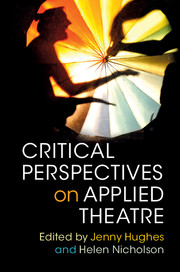Book contents
- Frontmatter
- Contents
- List of figures
- List of contributors
- 1 Applied theatre: ecology of practices
- PART I HISTORIES AND CULTURAL MEMORIES
- PART II PLACE, COMMUNITY AND ENVIRONMENT
- 6 Performing location: place and applied theatre
- 7 Peacebuilding performances in the aftermath of war: lessons from Bougainville
- 8 Applied theatre and climate change in Bangladesh: indigenous theatrics for neoliberal theatricks
- 9 Applied theatre and disaster capitalism: resisting and rebuilding in Christchurch
- PART III POETICS AND PARTICIPATION
- Notes
- Index
- References
8 - Applied theatre and climate change in Bangladesh: indigenous theatrics for neoliberal theatricks
from PART II - PLACE, COMMUNITY AND ENVIRONMENT
Published online by Cambridge University Press: 05 April 2016
- Frontmatter
- Contents
- List of figures
- List of contributors
- 1 Applied theatre: ecology of practices
- PART I HISTORIES AND CULTURAL MEMORIES
- PART II PLACE, COMMUNITY AND ENVIRONMENT
- 6 Performing location: place and applied theatre
- 7 Peacebuilding performances in the aftermath of war: lessons from Bougainville
- 8 Applied theatre and climate change in Bangladesh: indigenous theatrics for neoliberal theatricks
- 9 Applied theatre and disaster capitalism: resisting and rebuilding in Christchurch
- PART III POETICS AND PARTICIPATION
- Notes
- Index
- References
Summary
In the mid-1990s, a non-governmental organization (NGO) based in Khulna in south-western Bangladesh named Rupantar deployed Pot Gan, an indigenous form of performance, to devise a theatre process. Rupantar literally means ‘transformation’, and in Pot Gan (also known as Potuya Gan), narratives are visually illustrated with scroll paintings. This chapter examines how Rupantar successfully recreated, restored and adapted the ‘indigenous theatrics’ of Pot Gan to meet the challenge of climate change in Bangladesh, and at the same time will also chart how the process inevitably slips under neoliberalism. In consequence, ‘indigenous theatrics’, that is, ‘the art of theatre produced in Bangladesh’, emerges with a silent ‘k’ noxiously accommodated within ‘the art’, such that the notion of ‘theatrics’ now manifests itself as ‘theatricks’ to signify ‘theatre tricks’.
The chapter is informed by the explication of neoliberalism as a project concerned with institutional changes ushered by ‘the core tenets of Chicago School economics – privatization, deregulation and cuts to government services’ (Klein 2007: 561). Underpinned by the ideology that is generated from the quotidian experience of buying and selling commodities to become an image of the society, neoliberalism is a political project ‘that tries to render the social domain economic and to link a reduction in (welfare) state services and security systems to the increasing call for “personal responsibility” and “self-care”’ (Lemke 2001: 203). Informed by the findings from two field-level investigations conducted in 2013 and 2014 in south-western Bangladesh, the chapter proceeds in four sections: the first locates Rupantar and its recreated indigenous theatrics in the context of climate change threats in Bangladesh; the second examines how Rupantar's Pot Gan is devised and performed to serve as an interventionist tool to challenge climate change; and the third uncovers the slippage of Rupantar's practice under neoliberalism, and the consequent emergence of applied theatricks. Summing up the findings of the previous three, the concluding section enlarges the scope of the examination from the local to the global to present a metadiscourse on intervention, neoliberalism and performance. But it is necessary to insert a disclaimer at the outset: this is no finger-pointing exercise; if there is an ‘other’ that this examination addresses, it is necessarily the ‘self’.
- Type
- Chapter
- Information
- Critical Perspectives on Applied Theatre , pp. 150 - 171Publisher: Cambridge University PressPrint publication year: 2016
References
- 11
- Cited by



